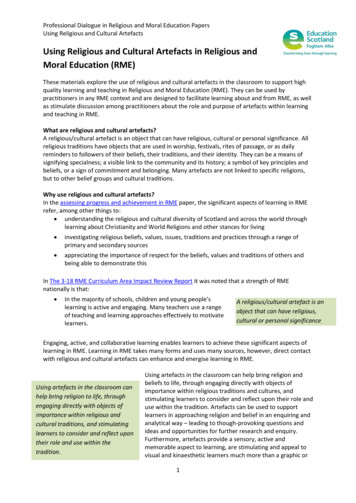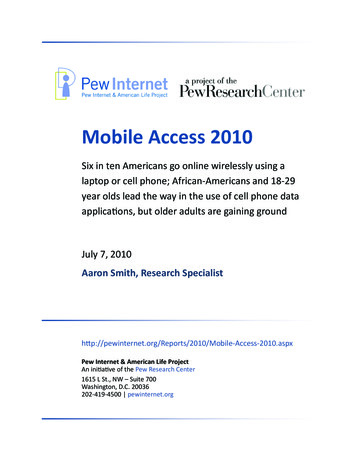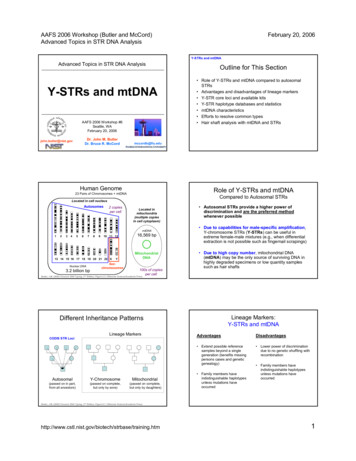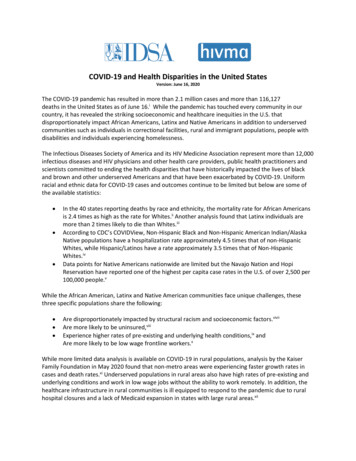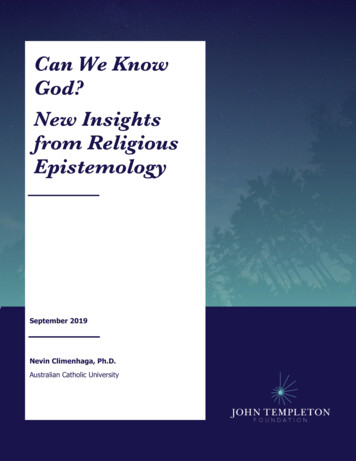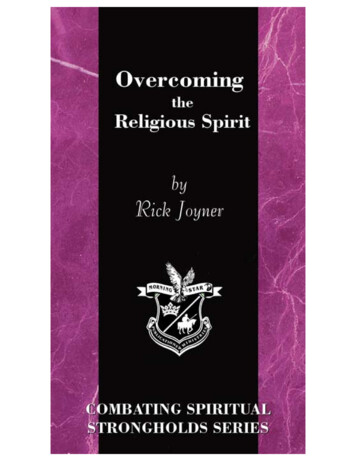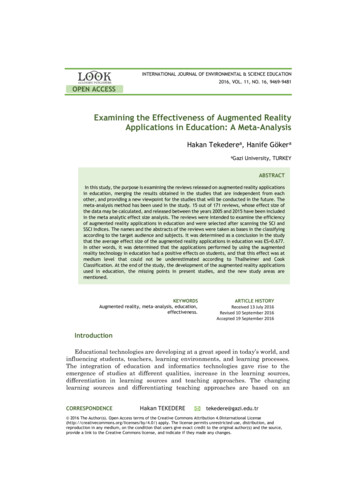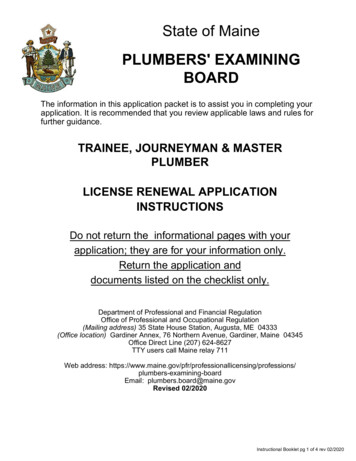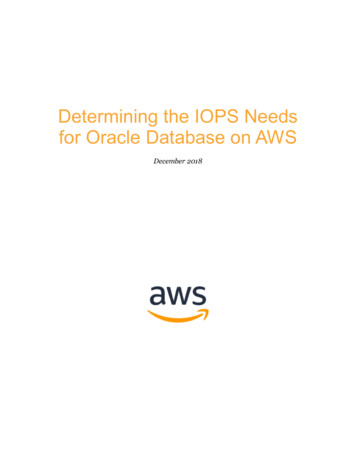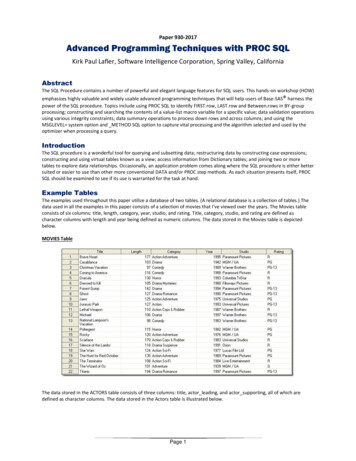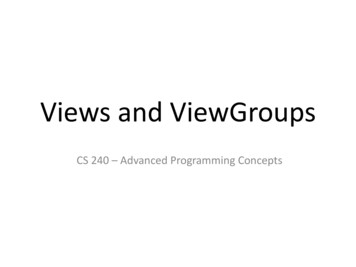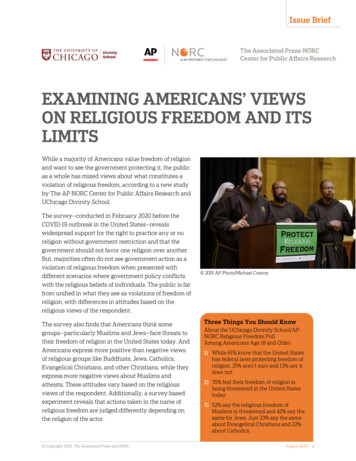
Transcription
Issue BriefEXAMINING AMERICANS’ VIEWSON RELIGIOUS FREEDOM AND ITSLIMITSWhile a majority of Americans value freedom of religionand want to see the government protecting it, the publicas a whole has mixed views about what constitutes aviolation of religious freedom, according to a new studyby The AP-NORC Center for Public Affairs Research andUChicago Divinity School.The survey—conducted in February 2020 before theCOVID-19 outbreak in the United States—revealswidespread support for the right to practice any or noreligion without government restriction and that thegovernment should not favor one religion over another.But, majorities often do not see government action as aviolation of religious freedom when presented withdifferent scenarios where government policy conflictswith the religious beliefs of individuals. The public is farfrom unified in what they see as violations of freedom ofreligion, with differences in attitudes based on thereligious views of the respondent.The survey also finds that Americans think somegroups—particularly Muslims and Jews—face threats totheir freedom of religion in the United States today. AndAmericans express more positive than negative viewsof religious groups like Buddhists, Jews, Catholics,Evangelical Christians, and other Christians, while theyexpress more negative views about Muslims andatheists. These attitudes vary based on the religiousviews of the respondent. Additionally, a survey-basedexperiment reveals that actions taken in the name ofreligious freedom are judged differently depending onthe religion of the actor. Copyright 2020. The Associated Press and NORC 2015 AP Photo/Michael ConroyThree Things You Should KnowAbout the UChicago Divinity School/APNORC Religious Freedom PollAmong Americans Age 18 and Older:1) While 61% know that the United Stateshas federal laws protecting freedom ofreligion, 25% aren’t sure and 13% say itdoes not.2) 35% feel their freedom of religion isbeing threatened in the United Statestoday.3) 52% say the religious freedom ofMuslims is threatened and 42% say thesame for Jews. Just 23% say the sameabout Evangelical Christians and 22%about Catholics.August 2020 1
EXAMINING AMERICANS’ VIEWS ON RELIGIOUS FREEDOM AND ITS LIMITSThe nationwide poll was conducted February 13-16, 2020, using the AmeriSpeak Panel , theprobability-based panel of NORC at the University of Chicago. Online and telephone interviews usinglandlines and cell phones were conducted with 1,015 adults. The margin of sample error is /- 4.2percentage points.Additional findings from the survey include: Sharp differences exist by education in what Americans think the government should be doing toprotect freedom of religion: those with a college degree are more likely than those with a highschool education or less to say federal policy should allow individuals to practice any religionwithout government restriction (87% vs. 69%) and that the government should not favor onereligion over another (78% vs. 52%). Twenty percent of Americans say they have taken action to express their views on freedom ofreligion, like donating money, volunteering for an organization, posting a message on social media,or participating in a demonstration. Thirty-five percent consider their freedom of religion threatened in the United States today, while44% say their own general rights or freedoms are challenged by other people’s claims about theirfreedom of religion. A majority (52%) think Muslims’ freedom of religion is threatened, and 42% say the same aboutJews. A quarter or fewer say other groups like Evangelical Christians, Catholics, Mormons, andatheists face challenges to their religious freedom. Sixty-one percent feel it would be a violation of freedom of religion for the federal government tobuild a pipeline through land that Native Americans consider sacred. On the other hand, less thanhalf say legal requirements about providing health benefits to same-sex couples (32%) or denyingschool enrollment to unvaccinated children (26%) violate religious freedoms. Overall, more Americans express negative than positive views about Muslims (32% vs. 23%) andatheists (26% vs. 22%). Opinions about Jews (42% vs. 7%), Buddhists (36% vs. 8%), Catholics (34% vs.18%), and other Christians (42% vs. 11%) are more positive than negative.MANY ARE UNCLEAR WHETHER FEDERAL LAWS PROTECT RELIGIOUSFREEDOM.Not all Americans know there are federal laws or policies protecting freedom of religion—61% say thereare, but 13% don’t think there are and 25% are not sure.Some groups are more aware of these laws than others. Both liberals1 (69%) and conservatives (65%)are more likely than moderates (46%) to know that the country has laws and policies protectingfreedom of religion. College graduates (80%) are also more likely than those with a high school degreeor less (45%) to say the country protects freedom of religion through its laws and policies.Among those who know that the United States has federal laws and policies protecting freedom ofreligion, many are able to identify specific protections granted by the First Amendment. Recognitionthat individuals can practice any religion without government restriction is the most widespread.Political ideology is self-reported based on responses to the questions, “Generally speaking, do you consider yourself to be a liberal, moderate orconservative?” / “Do you consider yourself closer to liberal, neither liberal nor conservative, or closer to conservative?”1 Copyright 2020. The Associated Press and NORCAugust 2020 2
EXAMINING AMERICANS’ VIEWS ON RELIGIOUS FREEDOM AND ITS LIMITSThose with a college degree are more likely than those with a high school degree or less to identifyseveral of these rights as protected. Some differences are also observed by gender, age, and income.Overall, a majority of Americans agree with the protections guaranteed by the First Amendment.Seventy-eight percent say Americans should be able to practice any religion without governmentrestriction, while more than 6 in 10 say individuals can practice no religion if they so choose and thatthe government does not favor one religion over another or over no religion at all. Again, there aresharp differences by education, with college educated Americans more likely to believe all these rightsshould be protected. Copyright 2020. The Associated Press and NORCAugust 2020 3
EXAMINING AMERICANS’ VIEWS ON RELIGIOUS FREEDOM AND ITS LIMITSFOR A MAJORITY OF AMERICANS, FREEDOM OF RELIGION IS ANIMPORTANT ISSUE AND ONE THAT FEELS UNDER THREAT.A majority of Americans hold issues related to freedom of religion to be personally important—55% sayit is very or extremely important to them, while 26% say they are somewhat important. Just 19% sayfreedom of religion issues are not personally important.Religious Americans are more likely to view these issues as personally important. Sixty-seven percentof Protestants2 and 55% of Catholics consider religious freedom an issue very or extremely importantto them. Fewer, but still one-third of atheists and agnostics view them as very or extremely important.Forty-two percent of those with other religions agree.Overall, 20% of Americans have taken action to express their views regarding freedom of religion.These actions could include donating money, volunteering for an organization, posting a message onsocial media, or participating in a demonstration. Somewhat more (28%) have taken these actions onother issues.2In this report, Protestants are those who say they are Protestant or “Just Christian” in response to the question, “What is your present religion, ifany?” Copyright 2020. The Associated Press and NORCAugust 2020 4
EXAMINING AMERICANS’ VIEWS ON RELIGIOUS FREEDOM AND ITS LIMITSReligiosity has a strong relationship with engagement on the issue. People who are affiliated with areligion are more likely to mobilize around issues related to freedom of religion than those who areunaffiliated (24% vs. 9%), but similarly likely to mobilize around other issues (29% vs. 26%). Catholics(24%) and Protestants (23%) are more likely to say they have been mobilized around issues of freedomof religion than atheists and agnostics (10%).More Americans feel their rights are threatened by other people’s claims of religious freedom than feeltheir own religious freedom is being challenged. Thirty-five percent of Americans feel their personalfreedom of religion is threatened. But 44% feel that claims of religious freedom by others clash withtheir own rights—including but not limited to religious rights. Copyright 2020. The Associated Press and NORCAugust 2020 5
EXAMINING AMERICANS’ VIEWS ON RELIGIOUS FREEDOM AND ITS LIMITSThose who say their religion is very or extremely important to them are more likely than those whosay religion is unimportant to them to feel their freedom of religion is being threatened (45% vs. 27%).AMERICANS PERCEIVE SOME RELIGIOUS GROUPS AS MORE UNDERTHREAT THAN OTHERS, WHILE ALSO SEEING SOME GROUPS AS MORETHREATENING.Many Americans perceive threats to others’ religious freedom in the United States, as well. A majority(52%) think Muslims’ freedom of religion is threatened, and 42% say the same about Jews. A quarter orfewer say other groups face challenges to their religious freedom.Perceptions of which groups’ freedom of religion is being threatened vary considerably based onideology and the personal importance of religion. Liberals are more likely than moderates and Copyright 2020. The Associated Press and NORCAugust 2020 6
EXAMINING AMERICANS’ VIEWS ON RELIGIOUS FREEDOM AND ITS LIMITSconservatives to say the freedom of religion of Muslims (78% vs. 50% and 36%), Jews (55% vs. 33% and39%), and atheists (34% vs. 19% and 12%) is being challenged.Those who say their religion is very or extremely important are more likely than those who say theirreligion is not very important to identify the freedoms of Evangelical Christians (33% vs. 14%) and otherChristians (36% vs. 13%) as being challenged. Further, those who say their religion is not very importantare more likely to perceive threats against the freedom of religion of Muslims (63% vs. 49%) andatheists (29% vs. 17%).Differences also arise across religious affiliations. Atheist and agnostic respondents are more likely tosee Muslims’ (70%), Jews’ (53%), and their fellow atheists’ (45%) freedom of religion being challenged,but are less likely to see Evangelical Christians’ (8%) and other Christians’ (8%) freedom of religionthreatened. Protestants are also most likely to see Muslims’ and Jews’ freedom threatened, but theyare more likely to see the freedom of Evangelicals and other Christians threatened compared toatheists and agnostics.White Evangelical Christians are less likely than all other Americans to say the freedom of religion ofMuslims (31% vs. 55%) is being threatened. Copyright 2020. The Associated Press and NORCAugust 2020 7
EXAMINING AMERICANS’ VIEWS ON RELIGIOUS FREEDOM AND ITS LIMITSWhile a majority of Americans feel that Muslims’ freedom of religion is being threatened in the UnitedStates, some perceive the claims of religious freedom by Muslims as threatening the rights of others.Thirty-two percent say the claims of religious freedom by Muslims threaten the rights of others, whilefewer claim other religious groups are a threat.Those who say their religion is extremely or very important are more than three times as likely to sayatheists’ claims to freedom of religion threaten others’ rights compared to those who do not view theirreligion as important (32% vs. 10%). On the other hand, those who say their religion is important are lesslikely than others to say Evangelicals’ (21% vs. 35%) and other Christians’ (21% vs. 29%) claims offreedom of religion threaten others’ rights.Differences in perceived threat also vary by religious affiliation. Atheists and agnostics are more likelyto say the claims of Evangelical Christians and Catholics threaten the rights of others, while Catholicsand Protestants are more likely to say the same about atheists. Copyright 2020. The Associated Press and NORCAugust 2020 8
EXAMINING AMERICANS’ VIEWS ON RELIGIOUS FREEDOM AND ITS LIMITSWhite Evangelical Christians are less likely than other Americans to say the claims of Catholics (8% vs.21%) and other Christians’ (12% vs. 24%) threaten others’ rights. They are also are less likely to say theirown (15% vs. 27%) claims threaten the rights of others.AMERICANS’ VIEWS ON THE LIMITS OF RELIGIOUS FREEDOM DEPENDON THE SITUATION.While a majority say issues related to freedom of religion are important to them, Americans havemixed views when it comes to the legitimacy of claims of religious freedom violations.Respondents were asked about six specific scenarios in which someone acts based on their religiousbeliefs and then faces consequences. In five of the six scenarios, respondents do not see theconsequences as a violation of religious freedom. Copyright 2020. The Associated Press and NORCAugust 2020 9
EXAMINING AMERICANS’ VIEWS ON RELIGIOUS FREEDOM AND ITS LIMITSAmericans have mixed views on the legitimacy of certain claims toreligious freedom.Percent of American adultsBecause of religious beliefs to help others,an American citizen provides humanitarianassistance to undocumented immigrants inthe U.S. desert. As a result, the Americancitizen is arrested by border patrol agentswho consider this assistance to be againstthe law.A parent does not vaccinate their childrenbecause of religious beliefs against thispractice and the children are deniedenrollment in public school because of itspolicy that all students must be vaccinated.The federal government builds a natural gaspipeline through land despite a NativeAmerican tribe’s objections because theyconsider the land to be sacred.A business owner is legally required toprovide family health care benefits to asame-sex couple despite the owner’sreligious beliefs that marriage is onlybetween a man and a woman.An Immigration and Custom Enforcement,also known as ICE, agent refuses toseparate undocumented parents andchildren because of religious beliefs aboutfamily unity and the government fires theagent for not following protocol. Copyright 2020. The Associated Press and NORCShould the citizen have beenarrested?32Does the arrest violate thecitizen's freedom ofreligion?41Should the unvaccinatedchildren have been deniedenrollment?Does denying enrollmentviolate the parent's feedomof religion?Should the government havebuilt the pipeline?67587226732869Does the pipeline violate theNative American tribe'sfreedom of religion?61Should the business ownerhave been required toprovide family benefits?71Does the health carerequirement violate thebusiness owner's freedomof religion?2637283266Should the ICE agent havebeen fired?3662Does the firing violate theICE agent's freedom ofreligion?3662August 2020 10
EXAMINING AMERICANS’ VIEWS ON RELIGIOUS FREEDOM AND ITS LIMITSAn employee at a government-run publicbenefit program is fired for acceptingapplicants for financial assistance who donot meet eligibility requirements because ofreligious beliefs to help everyone.Should the employee havebeen fired?Does the firing violate theemployee's freedom ofreligion?60253774Source: UChicago Divinity School/AP-NORC Poll conducted 2/13-16/2020, with 1,015 adults age 18 and oldernationwide.Notably, a majority of Americans do not feel that required vaccinations or legal requirements toprovide benefits to same-sex couples violate religious freedoms. The one scenario that a majority ofAmericans feel would be a violation of freedom of religion described the federal government buildinga pipeline through land that Native Americans consider sacred.In three of these scenarios, respondents who say their religion is very or extremely important are morelikely to say the particular consequence violates the individual’s religious freedom. Thirty-eightpercent of those who say their religion is important say that requiring a business owner to providefamily health care benefits to a same-sex couple violates the business owners’ freedom of religion,compared to 20% of those who say their religion is not very important. Similarly, more say the firing ofan ICE agent for refusing to separate families (43%) and the firing of a government employee foraccepting ineligible applicants (35%) violate freedom of religion compared to those who say theirreligion is less important (32% and 15%, respectively).MOST AMERICANS OPPOSE THE DECISION TO DENY A SERVICE TOOTHERS BASED ON CLAIMS OF RELIGIOUS FREEDOM.To see how Americans might feel differently about issues of freedom of religion based on the religionof the people involved, we asked them a series of questions about a hypothetical scenario where acaterer refuses to make food for a wedding because of the religious beliefs of the couple gettingmarried. The religions of both the caterer and the couple were varied across respondents. The text ofthe scenario reads:In a city in the United States, a caterer refuses to make food for a [insert couple’s religion] couple’swedding because the caterer only believes in celebrating [insert caterer’s religion] marriages.Respondents were then asked if they support or oppose the caterer’s decision not to make food for thecouple’s wedding.The respondents were randomly divided into four groups, and each group saw one version of thescenario with the following religion combinations: Group 1 saw the scenario with a Christian caterer and a Jewish couple. Group 2 saw it with a Jewish caterer and a Christian couple. Copyright 2020. The Associated Press and NORCAugust 2020 11
EXAMINING AMERICANS’ VIEWS ON RELIGIOUS FREEDOM AND ITS LIMITS Group 3 saw it with a Christian caterer and a Muslim couple. Group 4 saw it with a Muslim caterer and a Christian couple.For three of the four scenarios, more Americans opposed than favored the caterer’s decision to refuseto make the food for the couple’s wedding. Only the fourth scenario showed split opinions where 33%supported the Muslim caterer’s decision, 33% neither supported nor opposed, and 32% opposed it.When asked whether a court ruling that the caterer is required to make the food for the couple wouldviolate the caterer’s freedom of religion, Americans’ opinions are similar across scenarios. In all fourscenarios, less than half say this would violate the caterer’s freedom of religion. Copyright 2020. The Associated Press and NORCAugust 2020 12
EXAMINING AMERICANS’ VIEWS ON RELIGIOUS FREEDOM AND ITS LIMITSAsked if the court had ruled the other way, deciding that the caterer is not required to make the food,would this violate the couple’s freedoms and rights, a half to two-thirds in each scenario say it doesnot. The religion of the caterer and the couple was not associated with statistically different attitudeshere, either. Copyright 2020. The Associated Press and NORCAugust 2020 13
EXAMINING AMERICANS’ VIEWS ON RELIGIOUS FREEDOM AND ITS LIMITSHOW AMERICANS VIEW RELIGIOUS GROUPS AND OTHER GROUPS INSOCIETY DIFFERS BASED ON THEIR OWN RELIGIOUS IDENTIFICATION.Overall, Americans are most likely to say they have neither a positive nor a negative view of a varietyof religious and non-religious groups. However, they are more likely to express positive than negativeviews about certain groups like Jews, Catholics, Buddhists, and non-Catholic or non-EvangelicalChristians. On the other hand, more Americans express negative than positive views about atheistsand Muslims. They express more mixed views about Evangelical Christians and Mormons. Copyright 2020. The Associated Press and NORCAugust 2020 14
EXAMINING AMERICANS’ VIEWS ON RELIGIOUS FREEDOM AND ITS LIMITSAs a comparison to some non-religious groups, Americans have more positive than negative viewsabout immigrants (36% vs. 17%) and LGBT people (34% vs. 20%). Though again, the most commonresponse is holding neither positive nor negative views about immigrants (46%) and LGBT people(45%).Opinions on these groups vary depending on the religious identity of the respondent. Even whencontrolling for other factors like age, race, and partisanship, those who say religion is very orextremely important to them have more positive views of Jews, Mormons, Catholics, EvangelicalChristians, and other Christians compared to those who say religion is less important to them. On theother hand, those who say religion is less important are more likely to have positive views of LGBTpeople, Buddhists, and atheists. No matter the importance of religion, many have neither positive nornegative views of all these groups. Copyright 2020. The Associated Press and NORCAugust 2020 15
EXAMINING AMERICANS’ VIEWS ON RELIGIOUS FREEDOM AND ITS LIMITSProtestants and Catholics have similar views on many of these groups, but those views differ fromthose of atheists and agnostics. These religious groups have more positive views of EvangelicalChristians, while atheists and agnostics have more positive views of Buddhists, LGBT people,immigrants, and atheists. Again, many across each of these religious identifications have neitherpositive nor negative views of all these groups. Copyright 2020. The Associated Press and NORCAugust 2020 16
EXAMINING AMERICANS’ VIEWS ON RELIGIOUS FREEDOM AND ITS LIMITSFinally, white Evangelical Christians in particular have less positive views of Muslims compared toother Americans (10% vs. 25%).STUDY METHODOLOGYThis survey was conducted by the University of Chicago Divinity School and The Associated PressNORC Center for Public Affairs Research and with funding from NORC at the University of Chicago.Data were collected using the AmeriSpeak Omnibus , a monthly multi-client survey using NORC’sprobability-based panel designed to be representative of the U.S. household population. The surveywas part of a larger study that included questions about other topics not included in this report. Duringthe initial recruitment phase of the panel, randomly selected U.S. households were sampled with aknown, non-zero probability of selection from the NORC National Sample Frame and then contactedby U.S. mail, email, telephone, and field interviewers (face-to-face). The panel provides samplecoverage of approximately 97% of the U.S. household population. Those excluded from the sampleinclude people with P.O. Box only addresses, some addresses not listed in the USPS Delivery SequenceFile, and some newly constructed dwellings. Copyright 2020. The Associated Press and NORCAugust 2020 17
EXAMINING AMERICANS’ VIEWS ON RELIGIOUS FREEDOM AND ITS LIMITSInterviews for this survey were conducted between February 13 and 16, 2020, with adults age 18 andover representing the 50 states and the District of Columbia. Panel members were randomly drawnfrom AmeriSpeak, and 1,015 completed the survey—940 via the web and 75 via telephone. Interviewswere conducted in English. The final stage completion rate is 20.3%, the weighted household panelresponse rate is 24.1%, and the weighted household panel retention rate is 85.6%, for a cumulativeresponse rate of 4.2%. The overall margin of sampling error is /-4.2 percentage points at the 95%confidence level, including the design effect. The margin of sampling error may be higher forsubgroups.Once the sample has been selected and fielded, and all the study data have been collected and madefinal, a poststratification process is used to adjust for any survey nonresponse as well as anynoncoverage or under- and oversampling resulting from the study-specific sample design.Poststratification variables included age, gender, census division, race/ethnicity, and education.Weighting variables were obtained from the 2018 Current Population Survey. The weighted datareflect the U.S. population of adults age 18 and over.For more information, email info@apnorc.org.CONTRIBUTING RESEARCHERSFrom NORC at the University of ChicagoAcademic Research TeamDan MalatoMariana Meza HernandezWill BonnellJennifer BenzTrevor TompsonDavid Nirenberg (University of Chicago)Kraig Beyerlein (University of Notre Dame)Katheryn Lofton (Yale University)Geneviève Zubrzycki (University of Michigan)From The Associated PressEmily SwansonHannah FingerhutABOUT THE UNIVERSITY OF CHICAGO DIVINITY SCHOOLThe Divinity School generates knowledge about the history, theology, beliefs, and practices of religionsusing a broad array of methodological and theoretical approaches. One of the world’s leadinginstitutions in the academic study of religion, the Divinity School prepares students for careers inscholarship, teaching, and public religious leadership through multiple graduate and undergraduateprograms. https://divinity.uchicago.edu/ Copyright 2020. The Associated Press and NORCAugust 2020 18
EXAMINING AMERICANS’ VIEWS ON RELIGIOUS FREEDOM AND ITS LIMITSABOUT THE ASSOCIATED PRESS-NORC CENTER FOR PUBLIC AFFAIRSRESEARCHThe AP-NORC Center for Public Affairs Research taps into the power of social science research and thehighest-quality journalism to bring key information to people across the nation and throughout theworld. The Associated Press (AP) is an independent global news organization dedicated to factualreporting. Founded in 1846, AP today remains the most trusted source of fast, accurate, unbiasednews in all formats and the essential provider of the technology and services vital to the newsbusiness. More than half the world’s population sees AP journalism every day. www.ap.org NORC at the University of Chicago is one of the oldest objective and non-partisan researchinstitutions in the world. www.norc.orgThe two organizations have established The AP-NORC Center for Public Affairs Research to conduct,analyze, and distribute social science research in the public interest on newsworthy topics, and to usethe power of journalism to tell the stories that research reveals.The founding principles of The AP-NORC Center include a mandate to carefully preserve and protectthe scientific integrity and objectivity of NORC and the journalistic independence of AP. All workconducted by the Center conforms to the highest levels of scientific integrity to prevent any real orperceived bias in the research. All of the work of the Center is subject to review by its advisorycommittee to help ensure it meets these standards. The Center will publicize the results of all studiesand make all datasets and study documentation available to scholars and the public.Learn more at www.apnorc.org Copyright 2020. The Associated Press and NORCAugust 2020 19
religion is not very important to identify the freedoms of Evangelical Christians (33% vs. 14%) and other Christians (36% vs. 13%) as being challenged . Further, those who say their religion is not very important are more likely to perceive threats against the freedom of religion of Muslims (63% vs. 49%) and atheists (29% vs. 17%).
